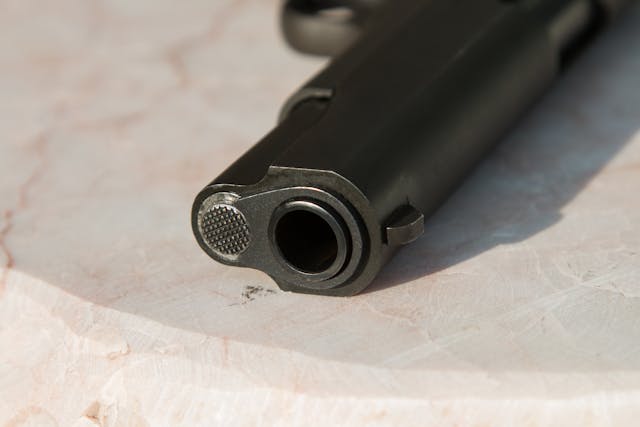Here’s What You Need to Know About Buying a Gun in Utah

Utah, with its expansive landscapes and strong outdoor culture, has a long-standing tradition of gun ownership. Whether for hunting, sport shooting, or personal protection, owning a firearm in Utah comes with specific responsibilities and legal considerations.
This article will guide you through the key factors to keep in mind when purchasing a gun in Utah, ensuring you are well-prepared and compliant with the law.
Learning about Federal and State Laws
When considering purchasing a gun in Utah, it’s important to familiarize yourself with both federal and state regulations. Federal laws set the groundwork for firearm purchases across the United States, but each state, including Utah, has its own set of rules that add to these federal guidelines.
Federal regulations, such as the Gun Control Act of 1968, establish the basic requirements for firearm sales, including the need for background checks for all purchases made through licensed dealers. However, Utah has additional laws that you need to follow. For instance, Utah does not require a permit to purchase a firearm, but it does have specific criteria for who can own a gun and how it can be carried.
Eligibility Requirements
In Utah, buying a firearm involves meeting specific requirements. First and foremost, age is a crucial factor. You must be at least 21 years old to buy a handgun from a licensed dealer in Utah and at least 18 years old to buy handgun from a private seller. Residency is another important requirement; you must be a resident of Utah or a non-resident with valid reasons, such as military duty, for purchasing a firearm in the state.
Moreover, before making a purchase, you must pass a background check. According to Utah gun purchase laws, this involves a thorough review of your criminal history, mental health records, and other relevant factors to ensure you are legally permitted to own a firearm. Conditions like certain felony convictions, restraining orders, or specific mental health issues can disqualify you from purchasing a gun. It’s essential to understand these criteria to ensure a smooth purchasing process and avoid legal issues.
The Purchasing Process
The process of buying a gun in Utah involves several steps, starting with selecting a licensed dealer. Dealers will guide you through the necessary paperwork and ensure compliance with federal and state regulations. You’ll be required to fill out ATF Form 4473, which collects personal information and details needed for the background check.
Once the form is submitted, the dealer will process the background check through the National Instant Criminal Background Check System (NICS). This check typically takes a few minutes but can take longer if additional review is necessary. Upon passing the background check, you can proceed with the purchase.
In Utah, there is no mandatory waiting period for firearm purchases. This means that once you pass the background check, you can take possession of your firearm immediately. However, it’s wise to take your time to understand the firearm you are purchasing and ensure it meets your needs and legal requirements.
Buying from a Dealer vs. Private Sale
When purchasing a firearm in Utah, you have the option of buying from a licensed dealer or through a private sale. Each method has its own set of procedures and considerations.
Buying from a licensed dealer is generally the safer and more straightforward option. Licensed dealers are required to conduct background checks on all buyers, ensuring that the purchaser is legally eligible to own a firearm. Dealers also provide detailed records of the transaction, which can be important for future reference and legal compliance.
Private sales, on the other hand, involve transactions between individuals without the oversight of a licensed dealer. While private sales are legal in Utah, they come with certain risks and responsibilities. It is crucial for both the buyer and the seller to understand and comply with all applicable laws. Sellers should take reasonable steps to ensure that the buyer is not prohibited from owning a firearm, such as requesting to see a concealed carry permit or conducting their own background check.
It is important to note that federal law prohibits private sellers from selling firearms to individuals they know or have reasonable cause to believe are prohibited from owning firearms. Therefore, exercising due diligence in private sales is essential to ensure compliance with the law and promote responsible gun ownership.
Safe Storage and Handling
Safe storage and handling of firearms are crucial responsibilities for gun owners. Proper storage not only protects your firearms from theft but also prevents unauthorized access, particularly by children or other vulnerable individuals.
Invest in a high-quality gun safe or lockbox to store your firearms securely. Ensure that your safe is sturdy, fire-resistant, and equipped with a reliable locking mechanism. Storing ammunition separately from firearms reduces the risk of accidental discharge and adds an extra layer of safety.
When handling firearms, always follow basic safety rules: treat every gun as if it is loaded, keep your finger off the trigger until you are ready to shoot, never point a gun at anything you do not intend to shoot, and be aware of your target and what is beyond it. Regularly practice these safety habits to minimize the risk of accidents.
Consider using additional safety devices, such as trigger locks or cable locks, to provide an extra layer of security. These devices make it more difficult for unauthorized users to operate your firearms. Additionally, educate all members of your household about gun safety and the importance of not handling firearms without proper training and supervision.
To Sum It Up
Buying a gun in Utah is a significant responsibility that requires thorough understanding and careful consideration. Staying informed about state laws, ensuring proper training, and prioritizing safety can help you become a responsible gun owner.
Embrace the resources available to you, and always make decisions that contribute to the safety and well-being of yourself and your community.






